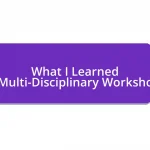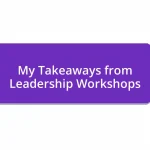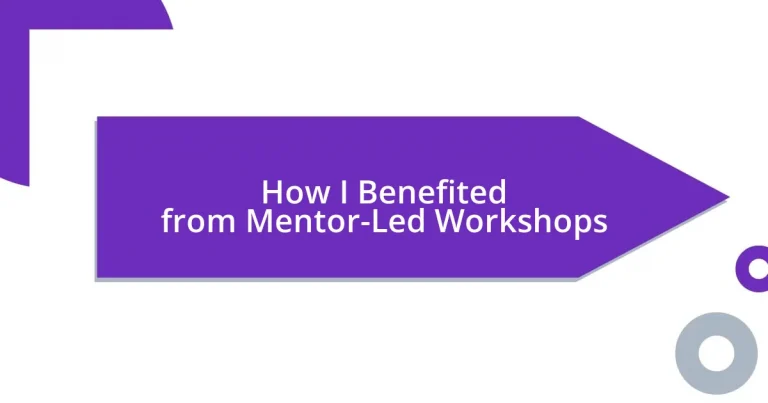Key takeaways:
- Mentor-led workshops foster personal connections and a supportive learning environment, enhancing the overall educational experience.
- Finding the right mentor, who shares common interests and values, significantly impacts personal and professional growth.
- Key skills developed through these workshops include improved communication, critical thinking, and networking abilities.
- Long-term benefits of mentorship involve building lasting relationships, cultivating a growth mindset, and enhancing self-confidence.
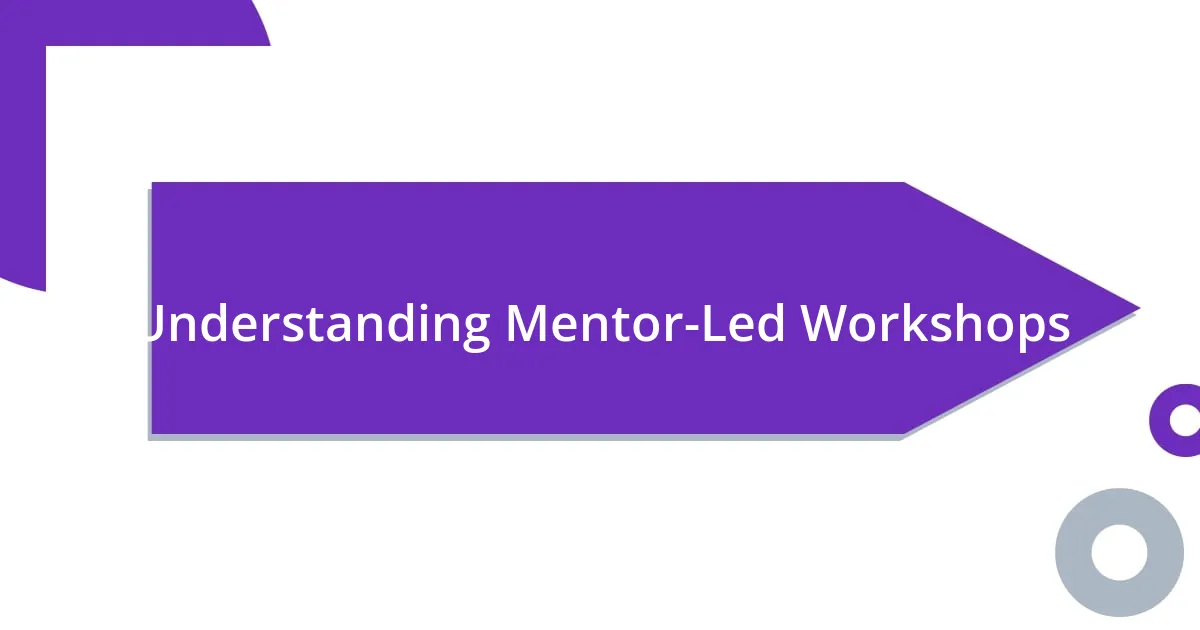
Understanding Mentor-Led Workshops
Mentor-led workshops are more than just learning opportunities; they’re transformative experiences that can shape your professional journey. I remember my first workshop vividly; the excitement was palpable as I walked into the room filled with eager participants. It made me wonder, what makes such environments so special? The blend of shared knowledge and personal interaction creates a unique space where learning flourishes.
In these workshops, mentors guide you through practical skills while sharing their real-world experiences. One workshop I attended focused on public speaking, and the mentor didn’t just show us techniques—he shared his own failures and triumphs on stage. Hearing his stories made me realize that vulnerability can lead to growth, and it deepened my understanding of the learning process. Isn’t it fascinating how personal anecdotes resonate more than just facts?
The interaction in mentor-led workshops fosters a community of learners. I recall feeling a connection with others in the room as we shared our struggles and successes. It’s easy to get lost in the crowd during more traditional forms of education, but here, each voice matters. Have you ever been in a situation where you felt truly heard? That’s the magic of mentor-led workshops—they encourage authentic discussions, making you feel seen and valued.
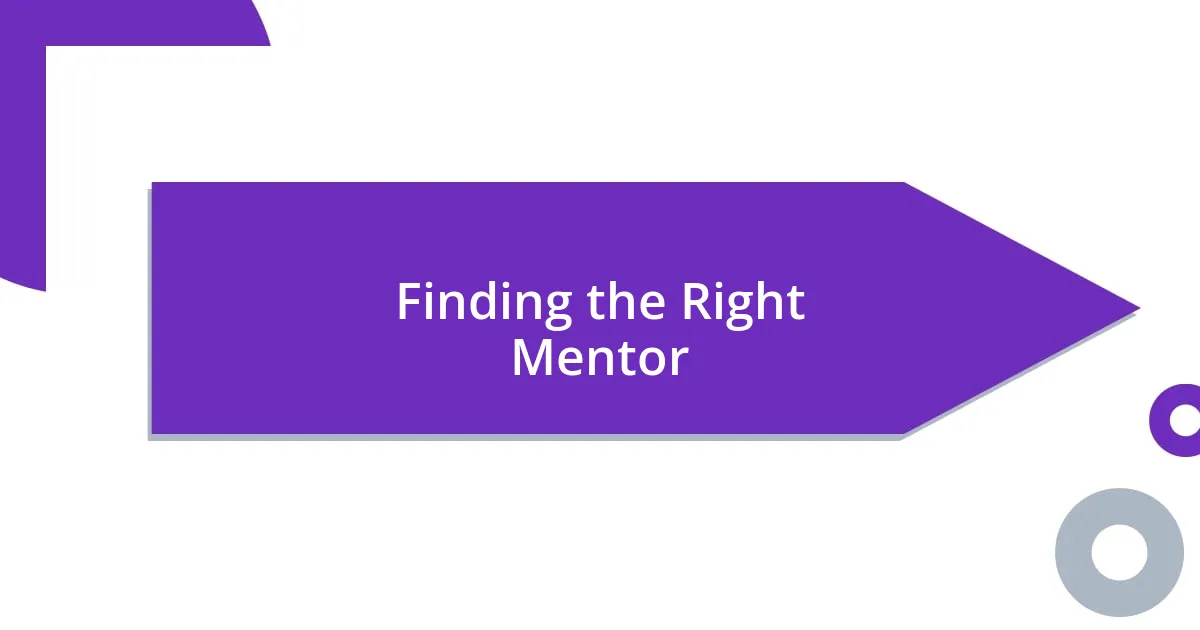
Finding the Right Mentor
Finding the right mentor is a crucial step in gaining the maximum benefit from mentor-led workshops. I once struggled to identify what I valued in a mentor, but that changed during a workshop where I met a mentor whose values aligned with mine. Watching her attentively guide us while embodying the traits I admired sparked a realization: the mentor-student dynamic works best when both parties resonate on a personal and professional level.
When searching for a mentor, consider these key factors:
- Common Interests: Look for someone whose expertise matches your personal or career goals.
- Shared Values: A mentor who aligns with your values can provide guidance that feels authentic and meaningful.
- Communication Style: Ensure their way of communicating resonates with you. An open, encouraging style fosters better learning.
- Professional Background: Consider their experience in your desired field; relevant expertise can provide invaluable insights.
- Willingness to Invest Time: A good mentor is committed to your growth. Observe if they show genuine interest in mentoring.
Reflecting on this process, I learned that it’s not only about the skills they share but also the connection you build. Finding a mentor you can relate to personally makes all the difference.
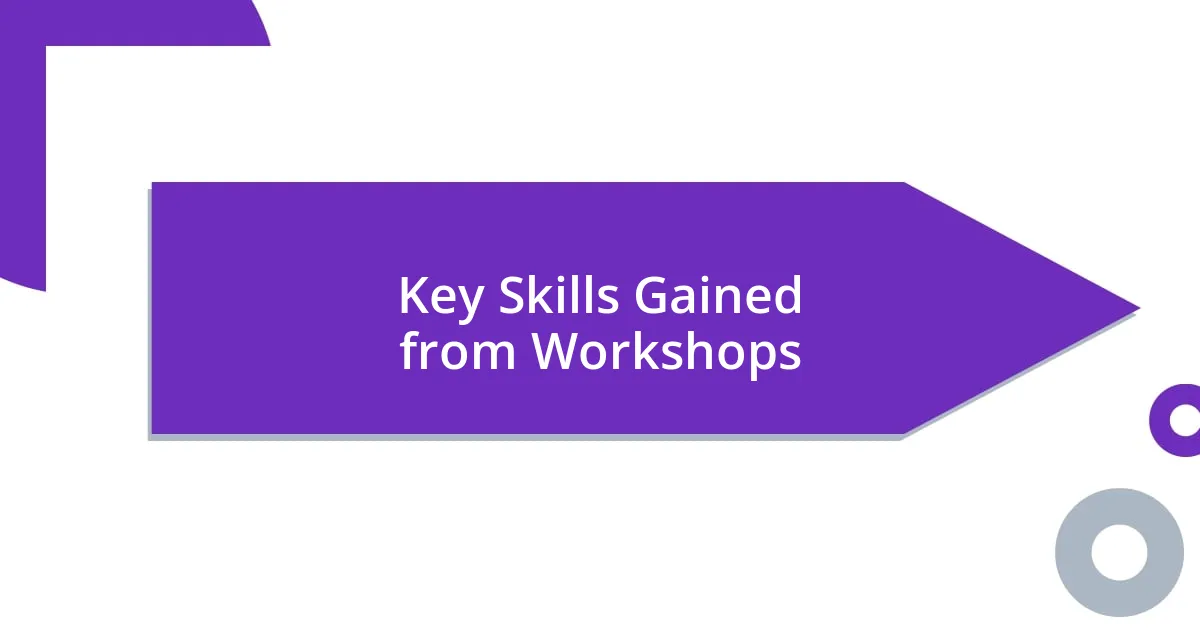
Key Skills Gained from Workshops
I have gained numerous key skills from attending mentor-led workshops that have enriched my professional development. One of the standout abilities was improved communication skills. I distinctly remember a workshop focused on effective storytelling. Initially, I was hesitant to share my stories, but the supportive environment encouraged me. By the end, I had developed a knack for weaving my experiences into engaging narratives, which has become invaluable in both my personal and professional life. Have you ever noticed how impactful good storytelling can be in connecting with others?
Critical thinking is another essential skill I honed through these workshops. I vividly recall a session dedicated to problem-solving techniques. The mentor presented real-world case studies that challenged my perspective and forced me to think outside the box. I found myself developing a stronger analytical framework for addressing complex problems, an ability that has positively influenced my decision-making process in various situations.
Finally, networking emerged as a crucial skill gained from these workshops. I participated in a workshop where we practiced not just introducing ourselves but genuinely connecting with others. I walked away with new contacts and friendships that extended beyond the workshop. Being surrounded by like-minded individuals who shared similar aspirations was invigorating. It reinforced the notion that learning is often a collaborative journey, don’t you find that sharing experiences with peers can lead to unexpected opportunities?
| Skill | Experience Gained |
|---|---|
| Communication | Refined storytelling from experiences shared, enhancing personal connections. |
| Critical Thinking | Developed problem-solving techniques through case study analysis. |
| Networking | Established valuable connections with peers, fostering a supportive learning community. |
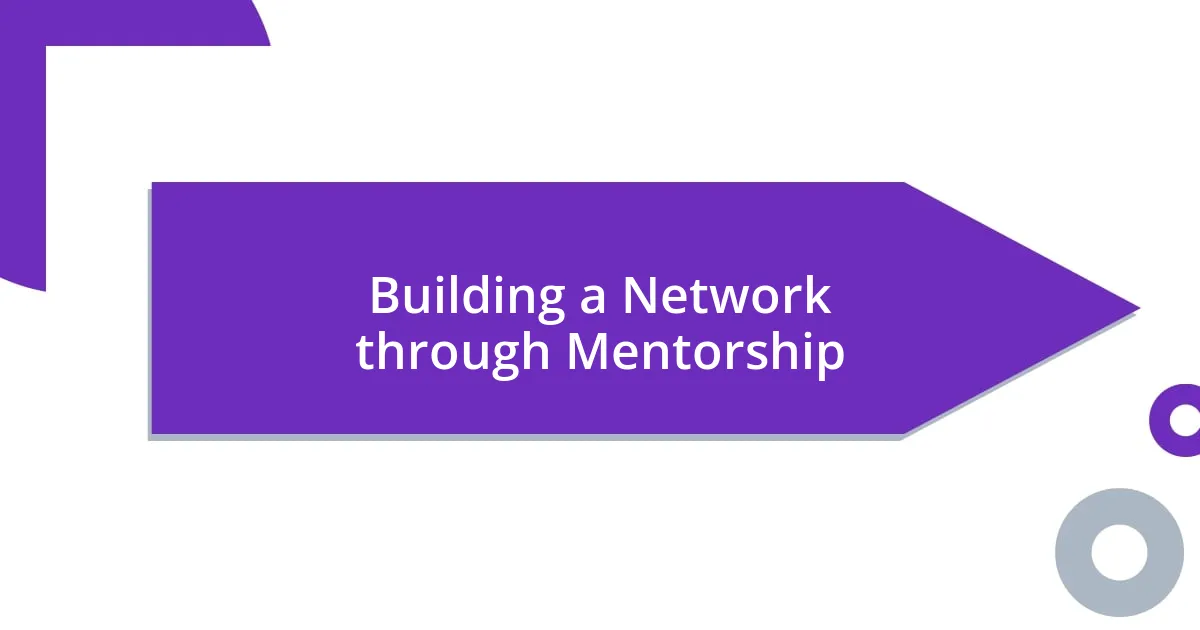
Building a Network through Mentorship
Building a network through mentorship has a transformative power that I didn’t fully appreciate until I experienced it firsthand. I remember attending a workshop where we were encouraged to share our career goals. The moment I spoke about my aspirations, several participants approached me afterward, eager to connect. That initial spark of conversation blossomed into lasting relationships, reminding me how networking can often stem from vulnerability and openness. Have you ever considered how sharing your journey can help you find allies along the way?
The intimate setting of mentorship workshops creates an atmosphere ripe for networking. One day, during a breakout session, I was paired with a mentor who had a wealth of experience in my field. Our discussion quickly turned into a brainstorming session, where I shared my ideas, and he provided insights that opened my eyes to different perspectives. By the end of that day, not only did I gain a mentor, but I also connected with several fellow participants who shared mutual interests. How often do we realize that genuine connections can emerge when we least expect them?
Through these experiences, I realized that networking is not just about collecting contacts; it’s about nurturing relationships built on shared experiences and support. After one workshop, I organized a casual meetup with those I had clicked with. Over coffee, we exchanged stories, challenges, and advice, reinforcing a sense of community. Those conversations proved invaluable as we all navigated our professional paths together. Isn’t it amazing how a simple act of reaching out can lead to a collaborative spirit that thrives long after the workshop ends?
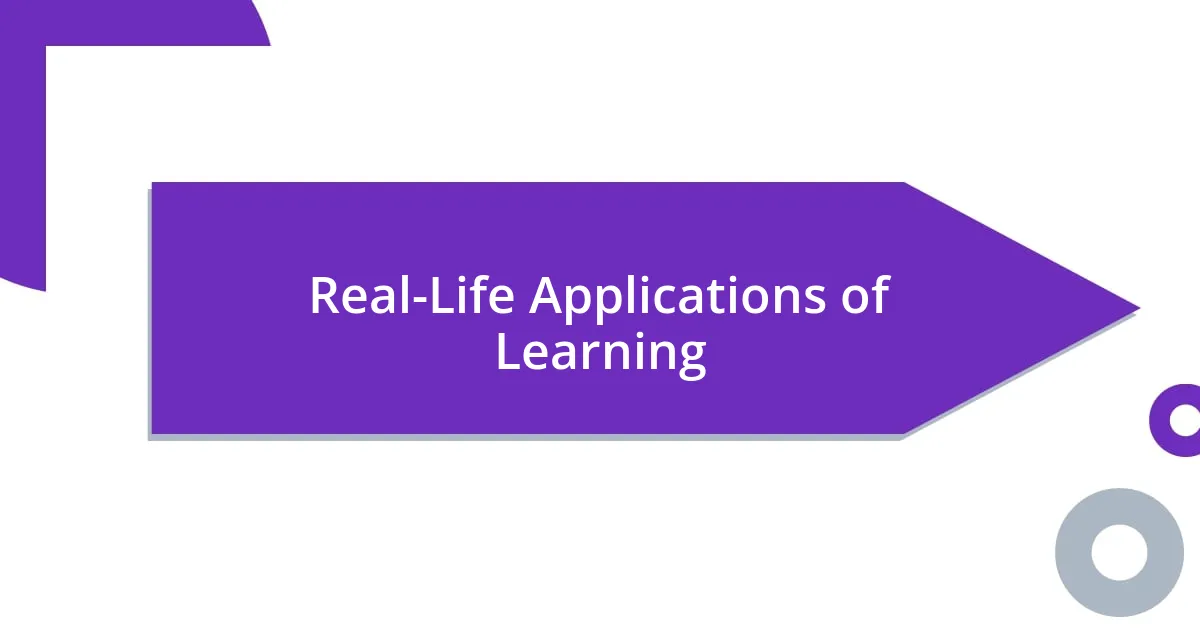
Real-Life Applications of Learning
Engaging in mentor-led workshops provided me with real-life applications that extended beyond theoretical learning. One workshop focused on time management. I vividly recall the moment when a mentor shared a practical approach called the “Pomodoro Technique.” At first, it seemed simple, but implementing it not only transformed how I handled tasks but also made mundane work feel invigorating. Has there ever been a technique that completely changed your workflow?
Another example comes from a workshop on financial literacy. While I thought I had a decent understanding of budgeting, the hands-on exercises revealed gaps in my knowledge. I learned to create a budget plan tailored to my lifestyle, which helped me save for future goals. I found myself feeling empowered whenever I checked in on my finances, realizing how critical it is to take ownership of one’s economic situation. Have you experienced that surge of confidence that comes from gaining control over your finances?
As I applied these skills in my daily life, I was surprised at how interconnected they became. The storytelling and networking techniques I learned in other workshops helped me articulate my new budgeting strategies to friends, turning finances into a relatable topic rather than a stressor. This expressive sharing allowed me to connect with others facing similar challenges, fostering a supportive dialogue. It’s interesting, isn’t it, how knowledge truly blossoms when shared?

Overcoming Challenges with Guidance
Overcoming challenges can sometimes feel overwhelming, but mentorship workshops taught me the value of having a guiding hand. I’ll never forget struggling with a complex project at work, feeling like I was lost at sea. During a workshop, I mentioned this to my mentor, who not only offered me practical advice but also shared his own stories of setbacks. His openness reassured me that challenges are part of the journey, and with the right guidance, they can become stepping stones rather than obstacles.
One workshop focused specifically on navigating difficult conversations. I was hesitant before, often choosing to avoid conflicts altogether. However, after role-playing various scenarios, I learned techniques that enabled me to express my thoughts confidently. The moment I applied these strategies during a tense team meeting, I felt a rush of empowerment. Have you ever transformed a daunting challenge into an opportunity for growth through mentorship? I certainly did, and it’s fascinating to see how such skills positively impact both personal and professional relationships.
On another occasion, tackling fears around public speaking felt insurmountable. Through a mentorship session, I discovered techniques to manage anxiety, like deep breathing and visualization. My mentor encouraged me to start small, like sharing my ideas with just a few colleagues before stepping up to larger groups. Each experience left me feeling a little less anxious and a little more confident. Isn’t it amazing how a supportive mentor can turn fears into triumphs, showing us that we’re not alone in our struggles?
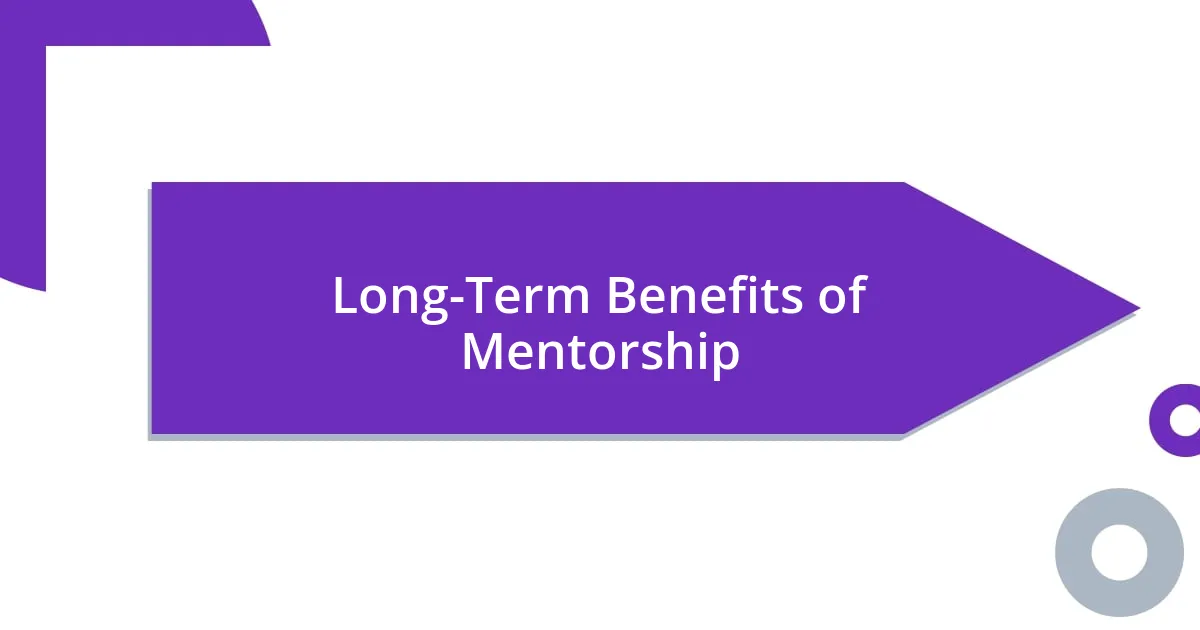
Long-Term Benefits of Mentorship
The long-term benefits of mentorship extend far beyond immediate skill acquisition. For instance, I remember a mentor who once told me that the connections we make during workshops could serve us lifelong. I didn’t quite get it at first, but over time, those relationships have opened doors I never expected. Have you ever considered how a simple conversation could evolve into a meaningful collaboration down the line?
Another crucial aspect of mentorship is the development of a growth mindset. With each workshop, I felt encouraged to embrace challenges rather than shy away from them. A mentor’s consistent focus on resilience taught me to see failures as learning opportunities. This mindset shift has made me approach both my personal and professional life with renewed vigor. Can you think of a moment when adopting a new perspective dramatically changed your approach to challenges?
Additionally, the continuous support from mentors helps solidify your self-confidence over time. I recall a mentor emphasizing the importance of celebrating small wins—a lesson I often remind myself about. This practice has not only fostered my self-esteem but has also shaped how I encourage others to recognize their achievements. It’s empowering to see the ripple effect of this confidence; when we uplift each other, the growth potential seems limitless, doesn’t it?
